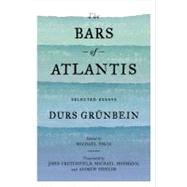
Note: Supplemental materials are not guaranteed with Rental or Used book purchases.
Purchase Benefits
What is included with this book?
Durs Grünbein is the author of six previous volumes of poetry and a collection of essays. His work has been awarded many majorGerman literary prizes, including the highest, the Georg Büchner Prize, which he won at age thirty-three. He has lived in Berlin since 1985.
| The Diving Bell and the Bristlemouth: The Art of Grünbein's Prose | p. vii |
| Preface | p. xix |
| Brief Report to an Academy | p. 3 |
| Volcano and Poem | p. 7 |
| Breaking the Body | p. 12 |
| Childhood in the Diorama | p. 22 |
| Three Miniatures | p. 32 |
| The Age of Deep-Sea Fish | p. 39 |
| Darwin's Eyes | p. 47 |
| My Babylonish Brain | p. 59 |
| To Lord Chandos: A Fax from the Future | p. 72 |
| Q as in Quotation | p. 75 |
| On the Question of Style | p. 79 |
| The Poem and Its Secret | p. 82 |
| Why Live Without Writing | p. 92 |
| Accented Time | p. 116 |
| The Bars of Atlantis | p. 132 |
| Madonna and Venus | p. 173 |
| One Sunday of Life | p. 186 |
| The Vanished Square | p. 193 |
| A Little Blue Girl | p. 209 |
| The Thinker's Voice | p. 228 |
| The Stroke of Apollo | p. 246 |
| In the Name of Extremes | p. 259 |
| A Tear for Petronius | p. 284 |
| Brother Juvenal | p. 300 |
| Between Antiquity and X | p. 315 |
| Acknowledgments | p. 321 |
| Table of Contents provided by Ingram. All Rights Reserved. |
The New copy of this book will include any supplemental materials advertised. Please check the title of the book to determine if it should include any access cards, study guides, lab manuals, CDs, etc.
The Used, Rental and eBook copies of this book are not guaranteed to include any supplemental materials. Typically, only the book itself is included. This is true even if the title states it includes any access cards, study guides, lab manuals, CDs, etc.